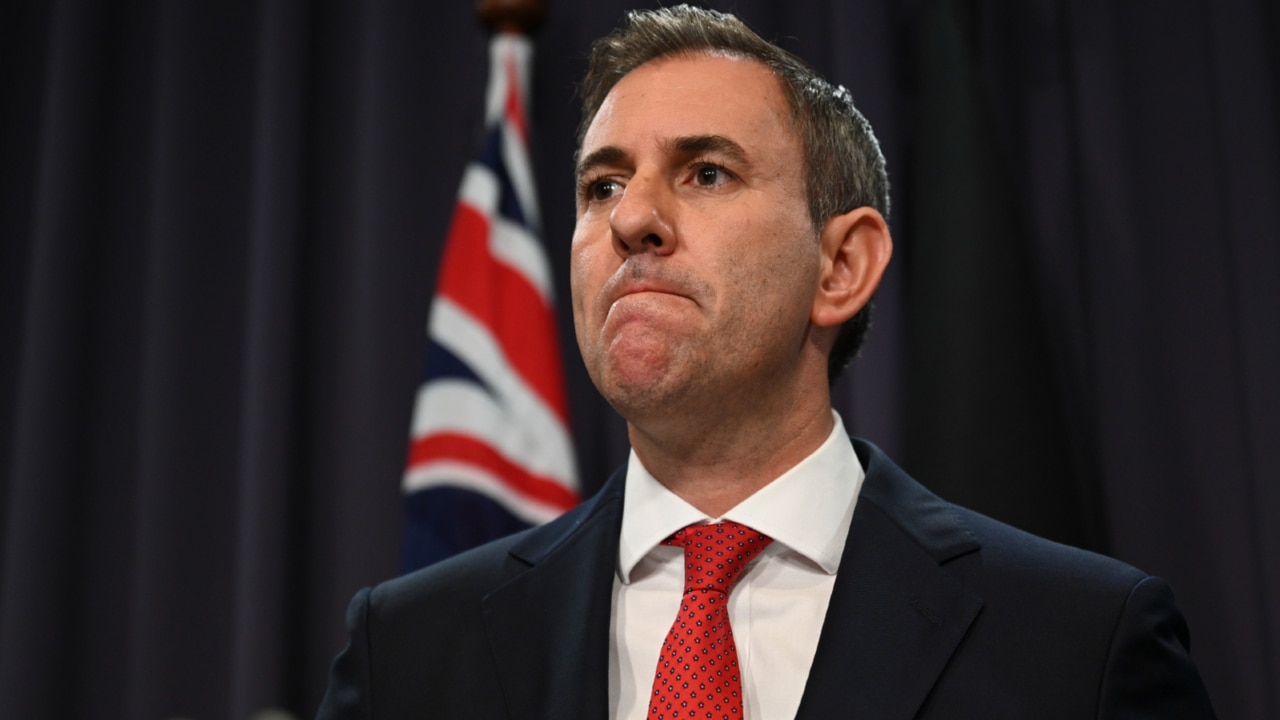Iron ore rout threatens budget billions
A sharp fall in the iron price, spurred by weak Chinese demand, threatens to stymie Jim Chalmers’s efforts to deliver a third consecutive budget surplus.

A sharp fall in the iron ore price could lower company tax receipts by about $3bn over the next four years, according to Treasury analysis, putting pressure on Jim Chalmers to find more savings in the budget to offset lost revenues.
In a blow to Australia’s budget bottom line, benchmark iron ore prices have tumbled 38 per cent since the start of the year as China’s steel mills have slashed output on weak demand, propelled by a protracted slowdown in the country’s property market and shrinking factory activity.
The price of the commodity – which traded above $US120 a tonne when the Treasurer handed down his third budget in May – fell 7.5 per cent last week alone after Chinese state-owned steelmaker Baowu cautioned of a “long and harsh” winter ahead for the industry.
While Finance Minister Katy Gallagher declared on Sunday the budget forecast for the iron ore assumptions was “conservative”, the government was contemplating the fallout for the nation’s finances.
The key steelmaking ingredient slipped to $US81.80 a tonne last Thursday, according to Treasury analysis, its lowest level since November 2022. That figure is slightly lower than Treasury’s forecasts in the May budget but well above the “long-run anchor price” of $US60 a tonne the government expects it to fall to by March.
However, Treasury has warned there will be a $3bn hit to revenues if iron ore prices fall to $US60 by the end of next month – six months ahead of budget projections.
The Treasurer said the softness in the Chinese economy, coupled with the recent fall in iron ore prices, was a reminder that Australia was “not immune” from volatility in global markets. “This is exactly why we take such a cautious and conservative approach to Treasury’s forecasts for resource prices and revenue,” Dr Chalmers said. “We’re following these developments very closely because of their potential impact on our economy and our budget.”
While Treasury is preparing for a worst-case scenario, veteran budget watcher Chris Richardson said he doubted iron ore would hit $US60 a tonne next year.
“Treasury always assumes armageddon and armageddon hasn’t happened till now,” he said.
“If anything, I continue to think that we will beat the budget trajectory from here.”
Mr Richardson estimated that every $US10 reduction in the iron ore price would result in a $10bn reduction in national income, with the federal budget similarly set to lose out on as much as $3bn due to the lower corporate tax take on mining industry profits.
The iron ore sell-off has also raised alarm at the Reserve Bank, with governor Michele Bullock on Friday warning that a further downturn in the Chinese economy could drive a further reduction in Australia’s GDP growth and the iron ore price.
“Developments in China can have quite a big impact on the way our trade develops, and therefore on our growth,” Ms Bullock told the House of Representatives economics committee.
While noting China’s GDP was still expected to expand in line with Beijing’s 5 per cent target, she cautioned that its debt-ridden property sector was acting as a “very big drag” on overall growth. “China is really important for us … It’s our biggest trading partner, and it’s very important in particular for the prices of the commodities that we export, in particular iron ore.”
Ms Bullock also pointed the finger at state governments for causing a “large chunk” of the additional public spending that was putting upward pressure on inflation, and declared the infrastructure pipeline was exacerbating the chronic housing shortage.
Facing an election in October, Queensland Premier Steven Miles, who has unleashed a wave of additional spending including $1000 power bill rebates, 50c public transport fares and a 20 per cent vehicle registration discount, rejected Ms Bullock’s claims.
“I didn’t read that into those comments,” he said on Sunday.
“What we are doing here in Queensland is supporting Queenslanders and building the infrastructure our state needs.”
Senator Gallagher said she hadn’t instructed state Labor governments to limit spending in light of Ms Bullock’s comments.
“The Treasurer and I don’t really tell other administrations, other governments, how to do their jobs,” she said. “But our focus is really on making sure that our budget wasn’t inflationary, but that it helped people with cost of living at the same time.”
Additional reporting: Lydia Lynch




To join the conversation, please log in. Don't have an account? Register
Join the conversation, you are commenting as Logout